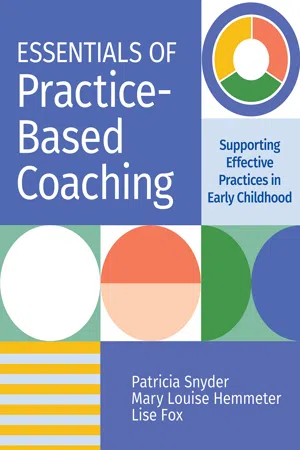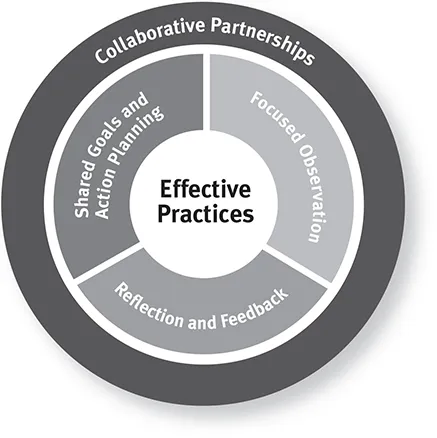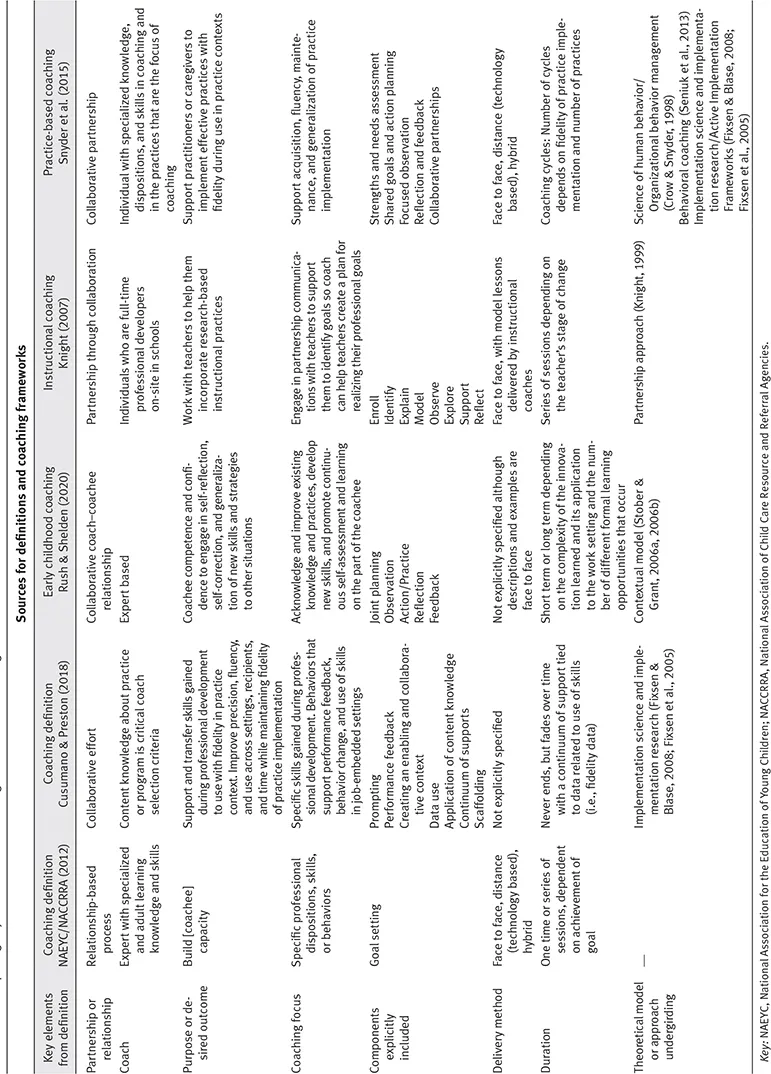![]()
1
Overview of Practice-Based Coaching
Theoretical, Empirical, and Practice-Based Rationales
Patricia Snyder, Mary Louise Hemmeter, and Lise Fox
INTRODUCTION
Practice-Based Coaching (PBC) is an empirically based coaching framework designed to support practitioners’ or caregivers’ implementation of evidence-based or recommended practices that lead to positive developmental and learning outcomes for infants, toddlers, and preschoolers (Snyder et al., 2015). As shown in Figure 1.1, the PBC framework has three key components: 1) shared goals and action planning, 2) focused observation, and 3) reflection and feedback. These components occur in the context of a collaborative coaching partnership, which is focused explicitly on supporting implementation of evidence-based or recommended practices.
Figure 1.1. Practice-Based Coaching framework. Snyder, P. A., Hemmeter, M. L., & Fox, L. (2015). Supporting implementation of evidence-based practices through practice-based coaching. Topics in Early Childhood Special Education, 35(3), 133–143. https://doi.org/10.1177/0271121415594925; reprinted by permission.
Each component of PBC and the essential elements needed to implement it as intended, or with fidelity, are the focus of this book. In this chapter, we set the context for the chapters that follow by providing background information about PBC and the theoretical, empirical, and practice-based rationales that support it.
The term evidence-based practices refers to effective practices that, when implemented as intended, have been demonstrated through empirical research to support children’s development and learning. Recommended practices refer to practices that are informed by the best available research evidence, the knowledge and wisdom gained through experiences applying practices in authentic contexts, and the values of an organization or field of practice. Examples of recommended practices are the Division for Early Childhood Recommended Practices in Early Intervention/Early Childhood Special Education (Division for Early Childhood, 2014). Throughout the book, the term effective practices will be used to encompass both types of practices. Chapter 5 provides information about how the term practice is defined within the PBC framework.
BACKGROUND FOR PRACTICE-BASED COACHING
PBC was initially developed, validated, and evaluated for efficacy as part of an Institute of Education Sciences (IES)–funded research project. The project was focused on evaluating the effects of professional development, which included what is now known as PBC, on preschool teachers’ use of embedded instruction practices. This work began in 2007 and continues to the present time (e.g., Snyder, Hemmeter, et al., 2018).
PBC was subsequently used in other IES-funded projects conducted by the editors and contributors to this text. In addition to embedded instruction, these projects have included the use of PBC along with workshops and other implementation aids to support practitioners’ use of social, emotional, and behavioral practices reflected in the Pyramid Model (e.g., Hemmeter et al., 2016; Hemmeter et al., 2021). PBC was the coaching framework used as part of the Head Start National Center on Quality Teaching and Learning (Head Start/ECLKC: Early Childhood Learning and Knowledge Center, n.d.). PBC is recognized as a critical professional development approach for the implementation of the Pyramid Model (von der Embse et al., 2019). It is also being used to support practitioners’ and caregivers’ implementation of evidence-based practices in early intervention, early childhood special education, and early care and education contexts (e.g., Fox, 2017; National Center for Pyramid Model Innovations, 2020; Snyder, Woods, et al., 2018).
Beyond projects in which contributors to this book have developed, validated, implemented, and evaluated PBC, many professional development providers, faculty in practitioner preparation programs, researchers, training and technical assistance personnel, coaches, program leaders, and practitioners are using PBC. For example, PBC has been used in studies focused on the BEST in CLASS intervention. BEST in CLASS is a Tier 2 intervention designed to address the needs of children (preschool to second grade) who demonstrate persistent and intensive challenging behaviors in classroom settings, which place them at future risk for developing social-emotional learning difficulties (e.g., Conroy et al., 2019). In addition, the most recent Head Start Program Performance Standards require that programs implement a research-based coordinated coaching strategy for education staff (Training and Professional Development, 2016). PBC is recognized as a research-based coordinated coaching strategy.
Given the widespread use of PBC in early childhood settings, we determined a need existed for a book that contains practical and evidence-informed information on the essentials of PBC. In this book, we provide detailed information about the PBC framework and each component of the framework, case story application examples, and resources to support fidelity of PBC implementation. After spending more than 16 years developing, refining, and evaluating PBC, we are committed to disseminating more widely this research-based coaching approach to support those who coach, those who are being coached, and those who oversee the implementation of professional development, including coaching.
Throughout the book, when appropriate, we refer to those who are being coached as coachees and those who are coaching as coaches. Coachees are practitioners in early childhood programs such as early care and education programs; state-funded preschool programs; Early Head Start/Head Start programs; inclusive infant, toddler, and preschool programs; home-visiting programs; and early intervention programs. Coachees can also be caregivers (e.g., parent, grandparent, family care provider). Coaches are individuals with a designated role as a coach or caregiver coach. Coaches can be internal to the program or external to the program as professional development or training and technical assistance providers.
Essentials of Practice-Based Coaching provides guidance on the use of PBC and the evaluation of how PBC is being implemented and whether it is being implemented as intended or with fidelity. A focus on implementation fidelity is particularly important for those adopting PBC. Promising findings related to practitioners’ and caregivers’ fidelity of implementation of effective practices following receipt of professional development that includes PBC, and associated positive child outcomes, are unlikely to be realized outside controlled research studies without attention to fidelity. This latter assertion is particularly important given that consensus has not been reached about how coaching should be defined and how components of coaching should be implemented across various early childhood sectors and contexts (Artman-Meeker et al., 2015; O’Keefe, 2017).
Practice-Based Coaching and Other Coaching Frameworks
Several coaching definitions have been offered in early childhood and related literatures, and the number of coaching frameworks or models appears to be growing. This growth is likely the result of multiple reviews and meta-analyses that have highlighted the promise of coaching as a job-embedded professional development strategy in early childhood and Kindergarten through Grade 12 (K–12) contexts (e.g., Artman-Meeker et al., 2015; Kraft et al., 2018; Lloyd & Modlin, 2012).
Table 1.1 shows key elements from coaching definitions or frameworks commonly used in early childhood or K–12 education. The coaching definitions in Table 1.1 are from the National Association for the Education of Young Children and the National Association of Child Care Resource and Referral Agencies (2012) and Cusumano and Preston (2018). In addition to PBC, frameworks included in Table 1.1 are an early childhood coaching framework (Rush & Shelden, 2020) and an instructional coaching framework (Knight, 2007). Although variations exist, commonalities are evident. Comparing the key elements of PBC to the definitions and other frameworks shown in Table 1.1 helps identify the common or distinct elements of PBC.
![]()
Table 1.1. Comparing key elements from coaching definitions or coaching frameworks
![]()
Each definition or framework identifies coaching as a relationship, partnership, or collaboration. In PBC, we distinguish a collaborative partnership from a relationship. A relationship is a broader term used to describe connections, often emotional, between two or more people. In PBC, a collaborative partnership focuses on connections to achieve goals. In PBC, the partnership is formed so the coach can support the coachees’ practice-focused goals. All aspects of PBC—conducting practice-focused strengths and needs assessment, goal setting and action planning, focused observation, and reflection and feedback—occur in the context of a collaborative partnership.
Across definitions and frameworks, coaches are identified as individuals with expertise in professional development, coaching, and adult learning principles. In PBC, we include these areas of expertise as well as explicitly acknowledging that coaches need specialized knowledge and skills in the practices that will be the focus of coaching (Snyder et al., 2015). The purposes or desired outcomes of coaching are to build coachees’ capacity, to strengthen their practice-focused competence and confidence, and to support them to implement effective practices with fidelity. In PBC, we specifically identify fidelity of practice implementation as the desired coaching outcome.
A focus on enhancing knowledge, skills, or practices is evident across the definitions and frameworks. In PBC, the focus is on coachees’ acquisition, fluency, maintenance, and generalization of practices. We define a practice as an observable or measurable action or behavior of a coachee. PBC guides practice implementation and supports contextual adaptation while ensuring practice integrity (Cusumano & Preston, 2018).
Components of coaching differ somewhat across the definitions and frameworks. The National Association for the Education of Young Children (NAEYC)/National Association of Child Care Resource and Referral Agencies (NACCRRA) definition only specifies a goal-setting component. Cusumano and Preston (2018) identify seven components in their coaching profile. In PBC, instructional coaching, and early childhood coaching, common components include setting goals, action planning, observation, and reflection. Feedback is included as a component in early childhood coaching, Cusumano and Preston’s coaching profile, and PBC. PBC distinguishes supportive and constructive feedback. PBC includes practice-focused strengths and needs assessment as part of goal setting and action planning, which is a distinct component.
As shown in Table 1.1, face-to-face interactions between the coach and coachee are recognized as a delivery method. In addition, NAEYC/NACCRRA and PBC include distance- or technology-based or hybrid delivery methods (e.g., live observatio...


